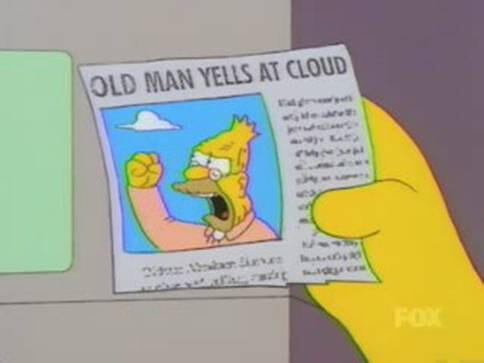http://www.cleveland.com/browns/index.ssf/2014/06/former_cleveland_browns_coach_1.html

BEREA, Ohio – There are some players and people around the game who believe the NFL needs to update and soften its drug policy involving marijuana.
They want to see thresholds for positive tests raised and suspensions reduced. The league reportedly is considering it as part of a broader, renegotiated plan.
Don't count former Browns coach Sam Rutigliano among those advocating change. He thinks liberalizing the league's stance on pot would not only be a mistake but a "catastrophe."
"For a lot of guys, marijuana is just the beginning," Rutigliano said. "A lot of times it can lead to cross-addictions and more serious things. I think it would be a catastrophe if we did that."
In 1981, Rutigliano and Cleveland Clinic doctor Gregory Collins developed the "Inner Circle," a confidential support group for Browns players battling substance abuse. The program's success spawned others like it around the league.
In recent years, however, the NFL has centralized the handling and discipline of drug issues. It offers peer-to-peer counseling through its Total Wellness initiative and designates "transition coaches," who act as liaisons between players and teams.
Collins wants to see the league return some autonomy to the individual clubs in dealing with players such as Browns receiver Josh Gordon, who reportedly is facing another drug suspension. Years ago, Browns players part of the Inner Circle, Collins said, were required to stay in the area year-round for counseling.
Under today's collective bargaining agreement, such a team mandate would unlikely be allowed.
"Some of the clubs . . . just want guys to play and win and not bother them about personal issues," said Collins, a Clinic staff psychologist and section head of the alcohol and drug recovery center.
"But these guys bring their personal issues to the club, and it plays out on the field and in the locker room . . . If clubs don't deal with their personal dimensions they are going to pay. That's our lesson."
Collins agrees with Rutigliano's assessment about the dangers of liberalizing NFL rules on marijuana. He makes three major points:
• Weed can be a "gateway drug" to stronger illegal substances.
• Rule changes regarding pot send a bad message to the public, especially kids.
• Marijuana slows reaction time and jeopardizes player safety.
"All and all, I'm in the camp that it's a terrible thing and we shouldn't go there," Collins said.
Rutigliano hates to see Gordon, who led the NFL in receiving yards last season, on the verge of a potential one-year ban. ESPN has reported it's due to a failed test for marijuana.
He knows some fans would like to see the Browns cut ties with Gordon, who served a two-game suspension last season. The old coach who helped counsel former players from addiction to sobriety isn't ready to take that step.
"I'd give him one more shot," Rutigliano said.

BEREA, Ohio – There are some players and people around the game who believe the NFL needs to update and soften its drug policy involving marijuana.
They want to see thresholds for positive tests raised and suspensions reduced. The league reportedly is considering it as part of a broader, renegotiated plan.
Don't count former Browns coach Sam Rutigliano among those advocating change. He thinks liberalizing the league's stance on pot would not only be a mistake but a "catastrophe."
"For a lot of guys, marijuana is just the beginning," Rutigliano said. "A lot of times it can lead to cross-addictions and more serious things. I think it would be a catastrophe if we did that."
In 1981, Rutigliano and Cleveland Clinic doctor Gregory Collins developed the "Inner Circle," a confidential support group for Browns players battling substance abuse. The program's success spawned others like it around the league.
In recent years, however, the NFL has centralized the handling and discipline of drug issues. It offers peer-to-peer counseling through its Total Wellness initiative and designates "transition coaches," who act as liaisons between players and teams.
Collins wants to see the league return some autonomy to the individual clubs in dealing with players such as Browns receiver Josh Gordon, who reportedly is facing another drug suspension. Years ago, Browns players part of the Inner Circle, Collins said, were required to stay in the area year-round for counseling.
Under today's collective bargaining agreement, such a team mandate would unlikely be allowed.
"Some of the clubs . . . just want guys to play and win and not bother them about personal issues," said Collins, a Clinic staff psychologist and section head of the alcohol and drug recovery center.
"But these guys bring their personal issues to the club, and it plays out on the field and in the locker room . . . If clubs don't deal with their personal dimensions they are going to pay. That's our lesson."
Collins agrees with Rutigliano's assessment about the dangers of liberalizing NFL rules on marijuana. He makes three major points:
• Weed can be a "gateway drug" to stronger illegal substances.
• Rule changes regarding pot send a bad message to the public, especially kids.
• Marijuana slows reaction time and jeopardizes player safety.
"All and all, I'm in the camp that it's a terrible thing and we shouldn't go there," Collins said.
Rutigliano hates to see Gordon, who led the NFL in receiving yards last season, on the verge of a potential one-year ban. ESPN has reported it's due to a failed test for marijuana.
He knows some fans would like to see the Browns cut ties with Gordon, who served a two-game suspension last season. The old coach who helped counsel former players from addiction to sobriety isn't ready to take that step.
"I'd give him one more shot," Rutigliano said.

